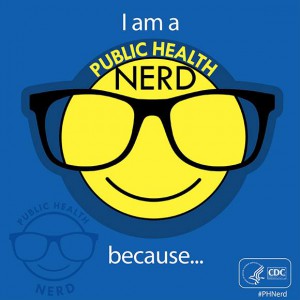 It’s been almost a year since I abandoned my not so well established career as a molecular biologist to board the public health ship, so it’s finally time for me to wrap up the identity crisis. I know what I was before (a lab rat), but what am I now? Apparently I now belong to the species broadly referred to as “public health professional”. Unfortunately, very few people seem to understand what that actually is. Are we scientists? Policy makers? Social workers? Are we losers who didn’t make it in any other field? If you have asked this question in the past, this blog post is the place for you to be. I do not claim to have the ultimate insight into the life of all public health professionals, but I have been around this species for long enough now to be able to give you a picture. Here is what I observed.
It’s been almost a year since I abandoned my not so well established career as a molecular biologist to board the public health ship, so it’s finally time for me to wrap up the identity crisis. I know what I was before (a lab rat), but what am I now? Apparently I now belong to the species broadly referred to as “public health professional”. Unfortunately, very few people seem to understand what that actually is. Are we scientists? Policy makers? Social workers? Are we losers who didn’t make it in any other field? If you have asked this question in the past, this blog post is the place for you to be. I do not claim to have the ultimate insight into the life of all public health professionals, but I have been around this species for long enough now to be able to give you a picture. Here is what I observed.
Habitat : The common public health professional is native to virtually every corner of the world even though, more often than not, he is well-adapted to a country other than his birthplace. His natural habitat is a very small cubicle in an open-plan office, where the temperature is kept at 12°C and sunlight is forever banned. The territory is usually shared with at least 15 other members of the same species, although public health professionals also seem to enjoy the company of ants and other crawling creatures.
: The common public health professional is native to virtually every corner of the world even though, more often than not, he is well-adapted to a country other than his birthplace. His natural habitat is a very small cubicle in an open-plan office, where the temperature is kept at 12°C and sunlight is forever banned. The territory is usually shared with at least 15 other members of the same species, although public health professionals also seem to enjoy the company of ants and other crawling creatures.
Curriculum:  Usually, the public health professional has a background in medicine, although biology, politics, computer science or similar subjects are also common. Whatever their education, all public health professionals devote their life to the same cause: studying and promoting health in their community. That said, their one true addiction is statistics. They cultivate a love-hate relationship with statistical software and a pure hate relationship with the concept of statistical significance. But strip a public health professional of its statistics skills and you’ll be left with a highly motivated visionary.
Usually, the public health professional has a background in medicine, although biology, politics, computer science or similar subjects are also common. Whatever their education, all public health professionals devote their life to the same cause: studying and promoting health in their community. That said, their one true addiction is statistics. They cultivate a love-hate relationship with statistical software and a pure hate relationship with the concept of statistical significance. But strip a public health professional of its statistics skills and you’ll be left with a highly motivated visionary.
Behaviour: The public health professional is supposed to be diurnal, but he enjoys the occasional nap during working hours and you are unlikely to find him awake in the hours after lunch. He usually spends most of the day in seated position staring at one or more computer screens, although you will find that some individuals prefer to stand upright like ostriches. Despite his morbid attachment to the computer screen, the public health professional usually loves a gregarious lifestyle. On an unreasonable number of occasions, he will make up random excuses to leave his post and chat up his colleagues.
The public health professional is supposed to be diurnal, but he enjoys the occasional nap during working hours and you are unlikely to find him awake in the hours after lunch. He usually spends most of the day in seated position staring at one or more computer screens, although you will find that some individuals prefer to stand upright like ostriches. Despite his morbid attachment to the computer screen, the public health professional usually loves a gregarious lifestyle. On an unreasonable number of occasions, he will make up random excuses to leave his post and chat up his colleagues.
Survival skills:  Most public health professionals are omnivorous, but virtually all of them survive on sweets. Even though they have the habit of preaching about healthy nutrition to others, their own spectrum of eating behaviours spans anything between sudden, uncontrolled eating attacks to skipping lunch three days in a row. Like general scientists, public health professionals practice the art of selective attendance of free-food events, and they have refined this technique to a precision beyond imagination.
Most public health professionals are omnivorous, but virtually all of them survive on sweets. Even though they have the habit of preaching about healthy nutrition to others, their own spectrum of eating behaviours spans anything between sudden, uncontrolled eating attacks to skipping lunch three days in a row. Like general scientists, public health professionals practice the art of selective attendance of free-food events, and they have refined this technique to a precision beyond imagination.
Three main character qualities (this is freely inspired on the NUS-SLING group, but if you are a public health professional, you might recognize yourself in one or the other quality).
- Curiosity: it’s the public health professional’s daily bread. Curiosity leads to questions, questions lead to research and research leads to evidence. Evidence is the public health professional’s most powerful weapon to turn his curiosity into knowledge and practice.
- Motivation: the rewards for a public health professional’s efforts include moderate public recognition and a disproportionately low salary. The public health professional will complain about it non-stop, but his motivation is inherent and will not be crushed by outer circumstances.
- Diligence: the public health professional has worked hard to earn his post in the cubicle. He has survived evening lectures and working weekends to find himself dealing with some of the most powerful forces on earth: politics, economics, infectious disease, cancer, tobacco… work never really leaves his mind, because public health is more an attitude than a profession.
At the end of the day, there is no such thing as a purebred public health professional. I guess the one and only truth about this peculiar species is that its members do not fall into one single category. It is a wonderful, precious species, although sometimes it does feel like a zoo around here.
